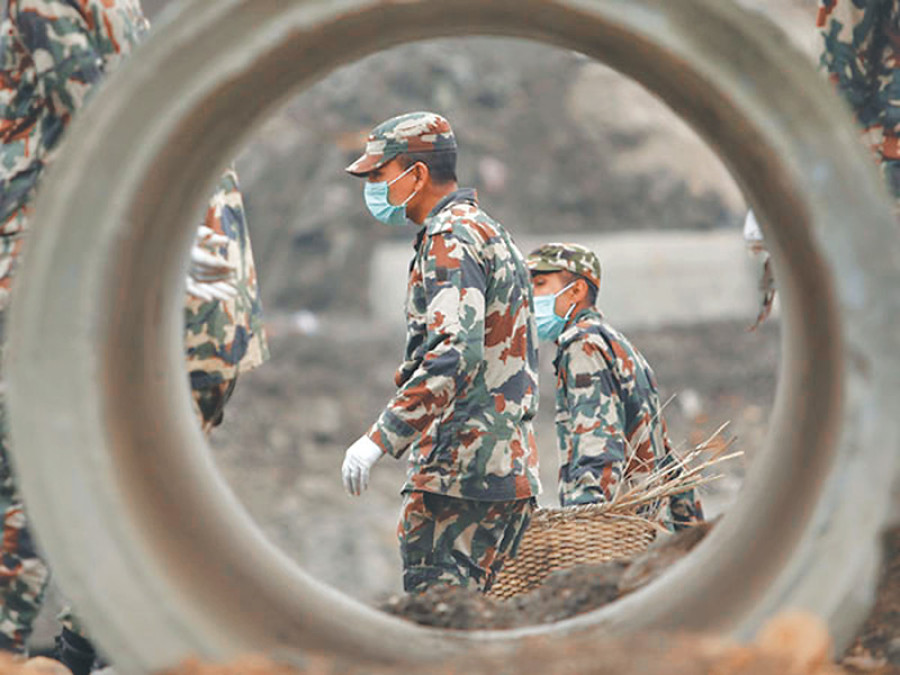Opinion
Personhood to rivers
Although there are thousands of rivers and rivulets in Nepal, Bagmati is the only one that has come to our notice
Swechha Ghimire
India has given the Ganges and Yamuna rivers the status of a legal person, which means they have equal rights as human beings. This was done to protect the sacred rivers from increasing pollution. The ruling of the High Court of the Indian state of Uttarakhand was very much inspired by the decision of New Zealand to grant similar rights to the Whanganui River. The High Court has also appointed three officials as legal custodians of the rivers and ordered the government to set up the Ganga Management Board. Rivers which hold religious and historic importance are given special protection by the state. Though the court decision reflects the Indian government’s sympathy for Hinduism, it is also an important step towards protecting the river and the environment. The decision means that these rivers will be able to enjoy the right to life till eternity, but it also depends on the Indian government’s effort to implement it.
In trouble
Nepal’s rivers are in trouble like rivers in the developing and developed countries. They have been poisoned by industrial effluents, hospital residues and residential sewage. When development comes at the cost of the environment, it is living beings who have to suffer. Aquatic life is endangered and the hydropower capacity is reduced by water pollution and deforestation caused by industrialisation and urbanisation. There are about 6,000 rivers and rivulets in Nepal. Most of them have been deeply affected by deforestation, sand mining and extraction of materials from the riverbed. Water levels are falling in the rivers. Thoughtless human actions have brought harm to rivers and water ecosystems. People are dying due to water-borne diseases and fresh drinking water is becoming scarcer. Construction activities have surged following the destruction caused by the earthquake, and there is a building boom in adjoining states in neighbouring India. As a result, there is high demand for riverbed materials. To meet the demand, traders have been engaging in haphazard extraction of sand and pebbles from the rivers in different parts of Nepal. At the same time, water pollution has affected aquatic life. The risk of natural disasters has increased too. There is a great risk of various hazardous diseases spreading in human settlements located on the banks of polluted rivers. Squatters live on the banks of the rivers in the Kathmandu Valley, and they suffer mostly in the rainy season when polluted water enters their dwellings. The government has made several unsuccessful attempts to remove these settlements. The squatters are also responsible for polluting the riverbanks, and they are the first to get affected by their actions.
Rivers are directly linked to the livelihoods of the inhabitants, the indigenous population of a particular locality. The rivers have religious and cultural importance, so protecting and preserving them should be the top priority of every concerned citizen. Protecting water resources and the existing rivers should be the prime concern of the related government ministries, agencies, civil society and every citizen.
Acts of preservation
Bagmati Saphai Abhiyan is a prominent example of citizen activism to preserve the Bagmati River. The campaign has completed 200 weeks, and has inspired other activities to preserve the river. It has been greatly commended, and it has helped to raise awareness about protecting water resources. The movement has been able to bring together government officials, security officials, civil society, education institutions, politicians and individuals from various sectors. Unfortunately, the Bagmati is the only river which has come to the notice of civil society.
The government of Nepal has unveiled many plans, the Supreme Court has handed down various rulings regarding water and the environment, many workshops and seminars have been held on water resource conservation and the importance of water has been included in the school curriculum, but, as usual, there is no effective implementation of what has been said and learned. Lack of strict implementation and impunity has meant that water resources continue to deteriorate.
There is no willingness to contribute individually to the protection of rivers. There are various legal provisions for the protection of water resources and the environment in the constitution, statutes and regulations. The Environment Protection Act, Water Resources Act, Soil and Watershed Conservation Act and Aquatic Animal Protection Act are major legal documents which contain provisions for the protection of rivers and aquatic habitats, but the laws remain as mere words on paper. The government has the primary responsibility to conserve water resources within its territory, but every individual should play their part and be a watchdog besides refraining from doing anything that might pollute the rivers. Every individual is responsible for the polluted rivers in their country. Citizens should be concerned about the activities which are harming the environment, in this case, our rivers. When rivers have been given the legal status of human beings in a neighbouring country and other states and countries have taken action to protect their rivers, we should at least respect what nature has given us and protect what we have. We should not forget that rivers give us hydropower to light our homes, water to drink, water to irrigate our crops and water for various other purposes.
We need to find the answers to these questions. Where are industrial effluents dumped? How are medical wastes treated and disposed of? Where does residential waste go? Why is there haphazard extraction of sand and pebbles? What are the treatment modalities for polluted rivers? We should keep putting these questions to the authorities. We should ask them about their roles and responsibilities until there is proper implementation of a mechanism to protect and conserve rivers which, in some countries, are treated as human beings.
Ghimire is an advocate and faculty member at National Law College




 9.6°C Kathmandu
9.6°C Kathmandu










